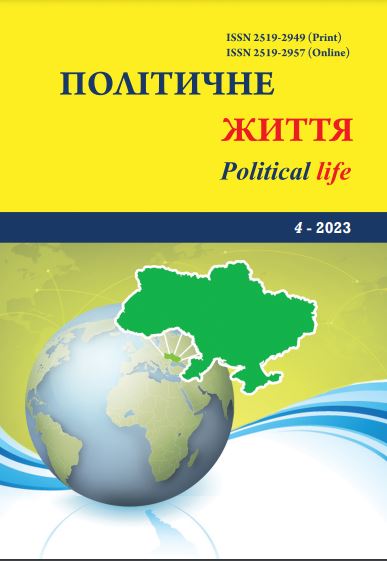The role of mediation in political negotiations: rethinking traditional approaches
DOI:
https://doi.org/10.31558/2519-2949.2023.4.16Keywords:
political mediation; mediation; conflict resolution; international politics; negotiationsAbstract
In this article, the impact of mediation in political negotiations, particularly the reevaluation of traditional approaches to resolving political conflicts, is examined. In the modern world, where political crises and conflicts are increasingly common, there is a growing need for more effective peace-making methods. In this context, traditional direct negotiations between conflict parties, while still important, are increasingly complemented by negotiations involving a third party – a mediator or facilitator. This novel approach not only expands the possibilities for conflict resolution but also offers alternative pathways for achieving mutual understanding and agreement between the parties. The aim of this article is to explore mediation and negotiations facilitated by a third party as an alternative to direct political negotiations. It analyzes how mediation can contribute to conflict resolution, providing a more flexible and innovative approach to diplomacy. The methodology includes analytical modeling, comparative analysis, and case studies. This allows not only for an assessment of the effectiveness of mediation but also for an understanding of its impact on the dynamics of international relations. Additional methods such as synthesis and analysis, inductive and deductive approaches, contribute to creating a comprehensive and balanced review of the topic. This approach enables the author to uncover the complexity and multifaceted nature of mediation in political negotiations. The article focuses on various aspects of mediation, including its role in resolving international conflicts, its impact on political processes, and its importance in ensuring stability and peace. Particular attention is given to the uniqueness of mediation negotiations, where the mediator acts as an independent individual seeking mutually acceptable solutions for both sides of the conflict. It is emphasized that the effectiveness of mediation depends on several factors, including the mediator’s ability to understand the interests and needs of both sides, their impartiality, and their ability to establish trust. The challenges and obstacles that mediation may encounter, as well as strategies for overcoming them, are also discussed. The main focus is on the role of mediation in contemporary international relations, considering its potential to resolve even the most complex conflicts.
References
Schelling, T.C. (1960). The Strategy of Conflict. Cambridge:Harvard University Press.
Rapoport, A. (1960). Fights, Games and Debates. Ann Arbor: University of Michigan Press.
Ikle, F. Ch. (1964). How Nations Negotiate. New York: Frederik A. Praeger.
Walton, R.E., McKersie (1965). A Behavioral Theory of Labor Negotiation. An Analysis of a Social Interaction System. New York: McGraw-Hill.
Wyrozumska, A., Czapliński, W. (2014). Prawo międzynarodowe publiczne. Zagadnienia systemowe. Warszawa: C.H. Beck 984 s. S. 461.
Qi, H. (2007). A Comparison of the Effectiveness of International Conflict Mediation Strategies. Chinese Journal of International Politics, vol. 1, s. 589-622.
Bargiel-Matusiewicz, K. (2007). Negocjacje i mediacje. Warszawa: Polskie Wydawnictwo Ekonomiczne, 87-96.
Wikipedia (2023). Portsmouth Peace Treaty <https://uk.wikipedia.org/wiki/Портсмутський_мирний_договір>
Svensson, I. (2007). Mediation with Muscles or Minds? Exploring Power Mediators and Pure Mediators in Civil Wars. International Negotiation. A Journal of Theory and Practice, 2, 229-248.
Bundy, W. (1998). A Tangel Web. The Making of Foreign Policy in the Nixon Presidency. London-New York: I.B. Taurus, 57.
Rotfeld, A.D. (2012) W cieniu. 12 rozmów z Marcinem Wojciechowskim. Warszawa: Polski Instytut Miédzynarodowych, s. 157.
Fisher, R. D., Ury, W. L., Patton, B. (2011) Getting to Yes: Negotiating Agreement Without Giving In. Penguin Books. 240 p.
Nye, J. S. (2023). Soft Power and Great-Power Competition. Springer Singapore. 208 p.
Walzer, M. (2002). The Company Of Critics: Social Criticsm And Political Commitment In The Twentieth Century Paperback. Basic Books. 288 p.

